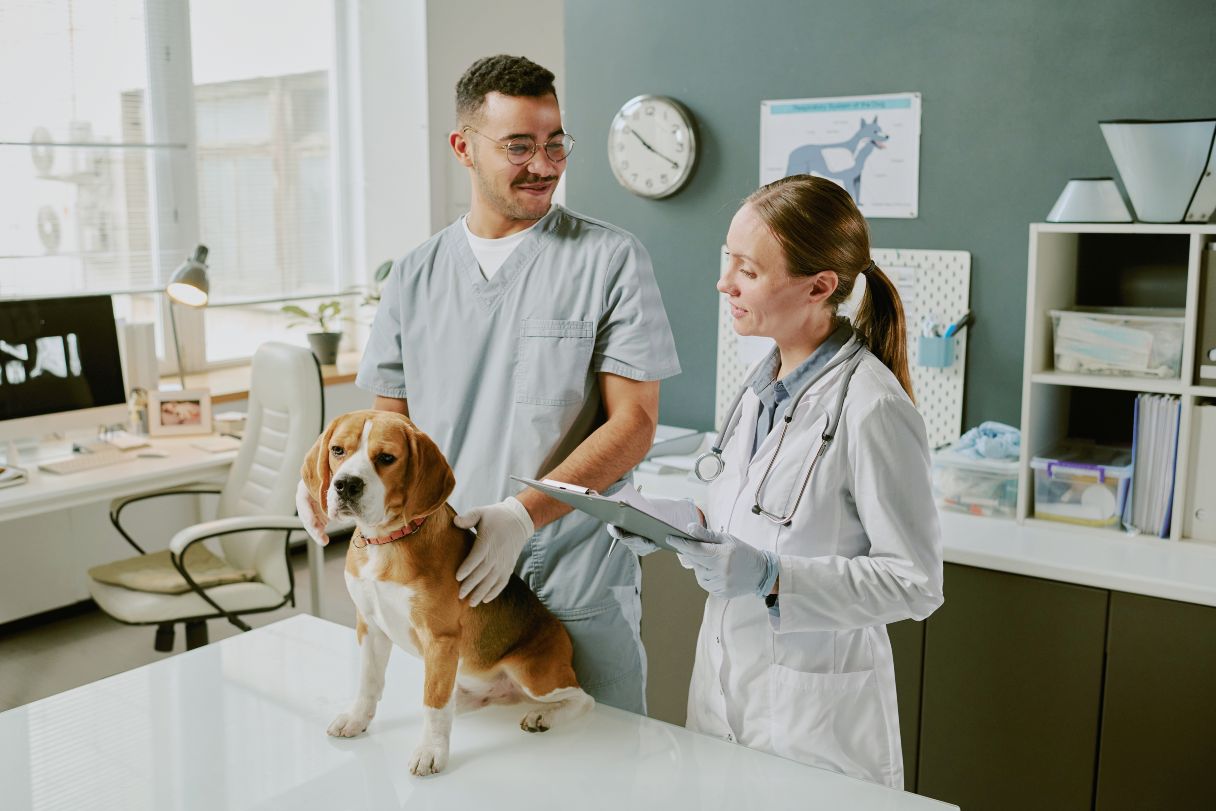Whether it’s for a routine checkup or an unexpected illness, veterinary care is a vital part of your pet’s lifelong health. But when it comes to making an appointment, many pet owners aren’t sure whether to visit a veterinary clinic or a hospital — and many mistakenly assume they’re the same.
In reality, these terms refer to distinct types of facilities with different capabilities. Knowing the difference can help you make the best choice for your pet’s specific needs.
What Is a Veterinary Clinic?
While the American Veterinary Medical Association (AVMA) doesn’t provide a legal definition for “veterinary clinic,” many veterinary state practice acts do include specific terminology.1 In most applications, “clinic” refers to an outpatient facility focused on preventive and routine care.
Veterinary clinics generally handle basic care, including wellness visits, vaccinations and common pet health concerns. They typically don’t offer overnight hospitalization or emergency services.
Examples of care a veterinary clinic may provide include:
- Basic lab work, such as heartworm testing, blood work and fecal exams
- Dental cleanings and routine tooth extractions
- Minor procedures and standard surgeries, such as spaying, neutering and small mass removals
- Parasite prevention
- Physical exams and health screenings
- Vaccinations
Veterinary clinic staffing and hours
Because veterinary clinics are often small in size and offerings, they also maintain a smaller staff. Clinics are usually attended by one or more veterinarians, veterinary technicians and supporting team members. Non-veterinarian staff may be cross-trained to provide support in multiple roles, such as a veterinary technician answering phones and scheduling appointments. Most veterinary clinics maintain normal daytime business hours and may offer weekend appointments.
What Is an Animal Hospital?
As with “clinic,” the term “animal hospital” is not formally defined by the AVMA. However, many states include precise language in their veterinary regulations and practice acts. Animal hospitals are generally larger than clinics in size and scope, providing a range and level of care similar to human hospitals.
Note that services at some veterinary hospitals can overlap with those provided at a clinic, and will also vary based on whether the hospital offers specialty or emergency care.
Care offerings at a veterinary hospital may include:
- Advanced surgeries and procedures
- Advanced treatments and therapies, such as chemotherapy
- Basic surgeries and procedures
- Emergency and critical care
- Higher-level diagnostic testing and imaging, such as ultrasound, magnetic resonance imaging (MRI) and computed tomography (CT)
- Overnight hospitalization and monitoring
- Preventive and wellness care
Animal hospital staffing and hours
Veterinary hospital staffing typically includes multiple veterinarians supported by a larger team of veterinary technicians, assistants and client coordinators. Because hospitals usually manage a higher volume and wider range of medical cases, staff are trained to deliver efficient, high-quality care in a fast-paced environment.
In addition to general practice veterinarians, some veterinary hospitals — often referred to as specialty or referral hospitals — also have board-certified veterinary specialists on staff. These are veterinarians who have completed advanced training and residency in specific fields such as surgery, internal medicine, radiology, dermatology or cardiology. Most hospitals and board-certified specialists do not require a referral to schedule an appointment.
As inpatient care providers, many veterinary hospitals provide overnight care for sick, injured or postoperative pets. This does not necessarily mean the hospital is open to the public overnight, though some do offer extended hours or 24-hour emergency services.
Key Differences Between Veterinary Clinics and Animal Hospitals
Understanding the difference between veterinary clinics and hospitals can be confusing, especially when care offerings overlap. Here’s a simple overview of what you’ll find at each facility.
| Feature | Veterinary clinic | Veterinary hospital |
|---|---|---|
| Care offerings |
|
|
| Cost |
|
|
| Emergency services |
|
|
| Equipment |
|
|
| Facility type |
|
|
| Hours |
|
|
| Pharmacy and inventory |
|
|
| Staffing |
|
|
When to Choose a Veterinary Clinic or Hospital
Choosing between a veterinary hospital and a clinic largely depends on several factors, including:
- Comfort level. If you like to build long-term relationships with your pet’s care team, you might appreciate the familiarity and consistency that often come with smaller veterinary clinics. That said, many hospitals also offer highly personalized care. Consider the size, structure and culture of the practice if this is an important feature for you and your pet.
- Continuity of care. If your pet has ongoing health needs, selecting a veterinary practice that can manage their care long-term or works closely with specialists can make treatment smoother and less stressful.
- Logistics such as location, cost and availability. Think about how you’ll transport your pet; if long car rides cause stress, choose a nearby clinic or hospital for routine care. Also, consider your budget and whether the facility’s hours fit your schedule.
- Services needed. If your pet needs health updates such as vaccinations, a heartworm test or an exam, these can be performed at a clinic. Alternatively, if extensive testing or overnight monitoring is needed, seek hospital-level care.
- Your pet’s health status. If your pet is experiencing an emergency or has a complex health problem, a veterinary hospital is the best choice. If your pet is healthy and simply needs a checkup, a clinic is appropriate.
Signs Your Pet Needs Hospital-Level Care
Sometimes your pet’s condition will dictate where you should go for veterinary care. Reasons for emergency or advanced veterinary attention include:
- Difficulty breathing
- Eye injuries
- Frequent vomiting and diarrhea
- Pale gums
- Paralysis or extreme weakness
- Persistent bleeding or known injury (e.g., hit by a car or a fall)
- Seizures
- Sudden aggressiveness, fear or withdrawn behavior
- Swelling or bloating
- Unresponsiveness
What’s Right For You? A Pet Parent Checklist
Use this simple checklist to ensure you know where to go for the best possible veterinary care in any circumstance.
1. Availability
Clinics typically operate during standard business hours, though some offer walk-in or same-day wellness appointments. Hospitals may have extended hours or 24/7 emergency care, but often require advance scheduling for non-urgent visits.
2. Cost of care
Compared to veterinary hospitals, clinics typically offer lower pricing for routine services but may have limited capabilities for advanced testing or care.
3. Location and access
Determine the distance to your preferred facility and how easy it is to get there — especially if your pet needs frequent care.
4. Payment options
Avoid surprises. Find out whether a clinic or hospital accepts the CareCredit credit card, other financing options or your pet’s health insurance plan. Pet insurance can typically be used for covered services provided by veterinary clinics and hospitals.
5. Visit goals
Know exactly what your pet needs? Call ahead or check online to ensure your preferred clinic or hospital can provide the care you’re looking for.
6. Your pet’s health
Choose a hospital for emergencies, chronic health problems and serious issues. Choose a veterinary clinic for routine visits and care.
Best of Both Worlds: Combining Options for Comprehensive Care
Every pet’s health needs are unique and can benefit from specific care, but veterinary clinics and hospitals work best when they’re used together, instead of in isolation. Clinics can offer valuable, convenient routine and preventive services that help support everyday pet health. Veterinary hospitals are equipped to provide a broader scope of lifetime care, often including preventive, specialty and emergency services. By recognizing how clinics and hospitals complement each other, pet owners can make more informed choices — and help ensure their companions receive the most complete care possible.
CareCredit Credit Card Financing for Pets
Taking good care of your pet’s well-being from nose to tail is essential. Make sure to stay up to date on their regular checkups at the vet to help keep your pet happy and healthy for a lifetime of love. You can use your CareCredit credit card for pet care throughout the year for routine veterinary services as well as emergencies and surgeries.* Use our Acceptance Locator to find a veterinarian near you that accepts CareCredit.
CareCredit is there for you and your pet every step of the way; continue your wellness journey by downloading the CareCredit Mobile App to manage your account, find a provider on the go and easily access the Well U blog for more great articles, podcasts and videos.
In addition to pet care, you can also use your CareCredit credit card for dentistry, cosmetic, vision, hearing, health systems, dermatology, pharmacy purchases, spa treatments and so much more within the CareCredit network. How will you invest in your health and wellness next?
Author Bio
Angela Beal, D.V.M., has more than 20 years of experience as a veterinarian. Leveraging her background in private practice and academia, she uses her passion for writing to convey information to pet owners to help them keep their pets healthy and happy.







